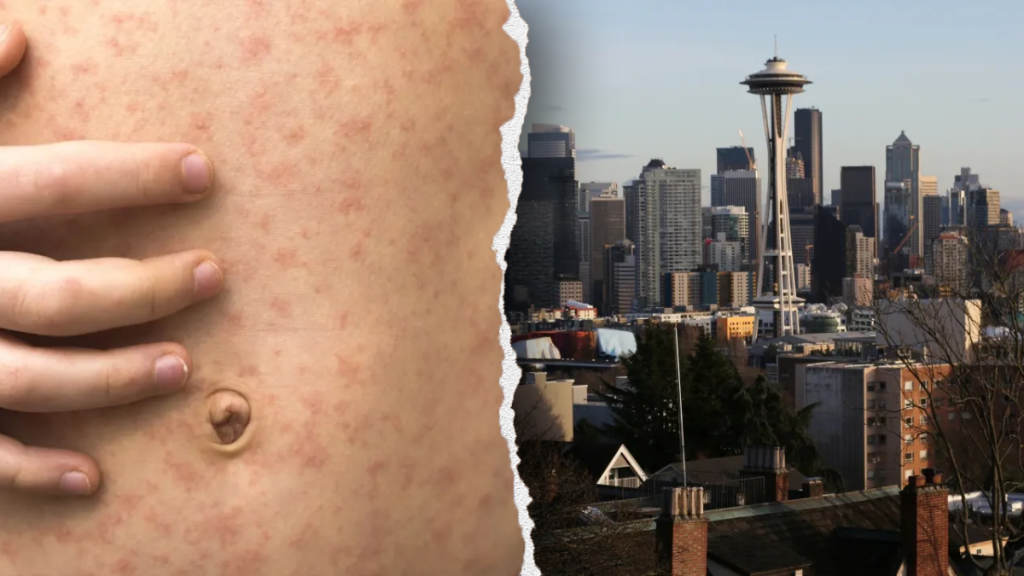SEATTLE, WA — Washington state health officials are urging the public to stay vigilant and review their vaccination status after confirming a case of measles involving a Canadian traveler who visited King and Snohomish counties while contagious.
The infected individual was later diagnosed in British Columbia, prompting an investigation and public exposure warning from local health authorities.
The Washington State Department of Health, in cooperation with Public Health – Seattle & King County and the Snohomish Health District, has identified numerous public exposure locations that the traveler visited from April 30 to May 3, 2025.
Officials are advising people who were at the same locations during those dates and times to be aware of early measles symptoms and, if unvaccinated, consult a healthcare provider.
Public Exposure Sites Identified Across Seattle Metro Area
Authorities have released a detailed list of potential measles exposure sites. These include transportation hubs, restaurants, and shopping centers in areas such as Renton, Bellevue, Seattle, Woodinville, and Everett. Among the affected locations are:
- Seattle-Tacoma International Airport (SEA)
- Home Depot in Redmond
- Uwajimaya Seattle Asian Market
- Chateau Ste. Michelle Winery
- Genki Sushi in Renton
- Topgolf in Renton
- Pho Mignon in Kirkland
- Stoup Brewing
- Kobo at Higo in Seattle’s Japantown
- A Bellevue hotel and several fitness centers
A full list of dates, times, and locations is available on the King County Public Health website. Those who were present at these sites during the specified times should be cautious and consider if they were at risk of exposure, especially if they are unvaccinated or immunocompromised.
📎 View exposure site details from King County
What to Know About Measles
Measles is a highly contagious viral illness that spreads through the air when an infected person breathes, coughs, or sneezes. According to the Centers for Disease Control and Prevention (CDC), the virus can remain infectious in the air for up to two hours after an infected person has left the area.
Even brief contact with airborne particles can result in infection in unprotected individuals.
Symptoms usually begin 7 to 14 days after exposure and include:
- High fever
- Cough
- Runny nose
- Red, watery eyes (conjunctivitis)
- Rash that begins on the face and spreads downward
Complications can be severe. About 1 in 5 unvaccinated people in the U.S. who get measles will require hospitalization. Complications can include pneumonia, encephalitis (brain swelling), and in rare cases, death.
📎 CDC Measles Facts and Information
Importance of Vaccination
Health officials stress that vaccination remains the most effective defense against measles. The MMR (measles, mumps, rubella) vaccine is safe and highly effective. Two doses of the MMR vaccine are about 97% effective at preventing measles. Children should receive the first dose at 12–15 months of age and a second dose at 4–6 years.
Unvaccinated adults who were born in 1957 or later and have no history of measles infection or vaccination are advised to get at least one dose of MMR. In some cases, getting the MMR vaccine within 72 hours of exposure can help prevent the onset of measles symptoms.
Dr. Eric Chow, Chief of Communicable Disease Epidemiology at Public Health – Seattle & King County, said in a statement, “We are urging everyone to check their immunization records and take precautions. Measles is preventable, but its contagious nature means we must act quickly to contain any potential spread.”

📎 Washington State Department of Health – Immunization Information
Global Measles Resurgence
The case in Washington is part of a broader trend. Global measles cases have been increasing due to declining vaccination rates during the COVID-19 pandemic and increased international travel. In 2024, the World Health Organization (WHO) warned that measles outbreaks could escalate worldwide without renewed vaccination efforts.
In the U.S., the CDC reported a rise in measles cases in early 2025, primarily linked to international travel and pockets of low vaccination coverage. This makes regional outbreaks more likely when a single imported case enters a vulnerable population.
Public Health Response and Next Steps
Local health departments are actively conducting contact tracing to identify those who may have been exposed and offer post-exposure prophylaxis, which may include the MMR vaccine or immune globulin.
Individuals who are at high risk, such as infants, pregnant women, or people with weakened immune systems, should seek medical advice if they believe they’ve been exposed.
Public Health – Seattle & King County continues to work with local businesses and health care providers to provide guidance on managing potential exposures.
“If you develop symptoms of measles, do not go to a medical facility without calling ahead,” said Dr. Chow. “This prevents further exposure to others, especially vulnerable populations in hospitals and clinics.”
Conclusion
As Washington officials continue to monitor the situation, the incident serves as a reminder of the importance of vaccination and public health readiness. Measles is no longer considered eliminated in several parts of the world, and this case underlines the ongoing threat of preventable diseases when immunization rates fall.
For residents of King County and surrounding areas, the best course of action is to review vaccination records, remain alert for symptoms, and consult healthcare professionals when in doubt. By acting swiftly, the spread of this highly contagious disease can be contained.
📎 For the latest measles updates, visit Washington Department of Health
Disclaimer – Our team has carefully fact-checked this article to make sure it’s accurate and free from any misinformation. We’re dedicated to keeping our content honest and reliable for our readers.
